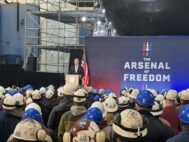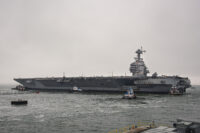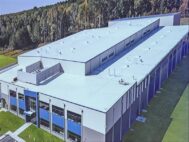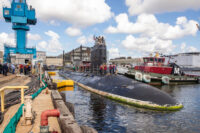In Newport News speech, Hegseth calls for faster delivery of warships
Secretary of Defense Pete Hegseth calls for faster delivery, tighter cost discipline in Newport News speech.
HII wins up to $471.97M Navy contract
Huntington Ingalls Industries has won a Navy contract worth up to $471.97 million to provide engineering support for aircraft carriers.
HII investing $28M for Hampton manufacturing facility
Newport News-based Fortune 500 contractor Huntington Ingalls Industries is investing $28 million to create an aircraft carrier and submarine manufacturing plant in Hampton, the city's mayor said Wednesday.
100 people to meet in 2026: Contractors
Federal funding is the fuel that primes Virginia’s economic engine, and these government contracting executives are the drivers directing major projects for civilian, defense and intelligence agencies.
William & Mary to be U.S. hub for AUKUS submarine pact
William & Mary will be the U.S. academic hub for a multinational effort aimed at advancing the development of nuclear-powered submarines.
Newport News Shipbuilding lays off 167 workers
Newport News Shipbuilding laid off 167 employees on Wednesday that had been previously furloughed this year.
HII promotes exec to new maritime systems post
HII announced Thursday that it has promoted Eric Chewning to executive vice president of maritime systems and corporate strategy.
Newport News Shipbuilding to furlough 471 workers
Newport News Shipbuilding on Friday announced that it will furlough 471 shipbuilders for up to five months.
Antitrust lawsuit against General Dynamics, HII revived in appeals court
Two former naval engineers who claimed that General Dynamics, Huntington Ingalls Industries and more than a dozen other government contractors and shipbuilders illegally agreed to not poach each other's employees will receive a rehearing, a federal appeals court panel ruled this month.
HII, General Dynamics win up to $18.4B submarine contract modification
Huntington Ingalls and General Dynamics have been awarded Navy contract modifications worth up to a possible $18.4 billion to build two Virginia-class submarines, the Department of Defense announced.
HII division awarded $133M Air National Guard contract
Huntington Ingalls Industries’ McLean-based Mission Technologies division won a $133 million contract by the U.S. Air National Guard to support and provide training for flying units. HII, which made the announcement Wednesday, said this will be accomplished through live, virtual and constructive training in a 10-year task order. Mission Technologies will provide expertise and staffing [&hell[...]
HII awarded $147M contract to assist Navy
Huntington Ingalls Industries’ McLean-based Mission Technologies division has been awarded a $147 million contract to support shipboard and shore-based combat training services for the U.S. Navy. HII, which made the announcement Tuesday, says the five-year task order will provide engineering support for every aspect of training systems under the U.S. Naval Surface Warfare Center Dahlgren [&h[...]























